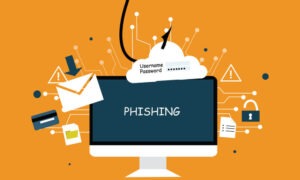
With so many more people spending time on their computers, Internet scams have increased.
Scammers are using email and text messages to trick people into giving them their contact and personal information. They use that to clean out bank accounts.
The FBI’s Internet Crime Complaint Center says that “people lost $57 million to phishing schemes in one year.”
Here’s how you can recognize a phishing scam: email and text messages will look like a company you know and trust like a bank, credit card company, social media site, a store you might frequent, and online payment sites.
Common messages include these:
- Suspicious activity or log-in attempts.
- A problem with your account or your payment information.
- Request that you confirm personal information.
- Ask that you open a fake invoice.
- Request that you click on a link to make a payment.
- Your eligibility for a government refund.
- An offer for free stuff.
Email scam messages are particularly dangerous because the goal is to have you click on a link or open a document that installs malware on your computer. Many of the messages will claim to put your accounts on hold if you don’t pay immediately
Here’s a look at some of the more popular scams since the start of the COVID-19 pandemic.
Robocall Check Scam
The caller pretends to be with the IRS and requests your personal information.
Email and Text Scams
IRS impersonators request that you click on a link sent via text or email. Once someone clicks on the link, malware activates on their phone or computer.
Google Search Scam
Fake IRS “Get My Payment” site dupe visitors into leaving their bank information. The sites rank high on web pages and are often among the first sites that appear in a search.
Third Party-Relief Scams
Scammers develop fake stimulus programs, claiming they can provide additional money along with the government. Companies send letters, emails and hand out flyers.
What to do?
There are steps you can take if you become aware of phishing scams or become a victim of one.
Contact the Internet Complaint Center and file a report. Your information will help federal authorities track down scammers and bring them to justice.
Contact the company or government agency they’re impersonating. Banks, retailers and agencies like the IRS are on the lookout for scams and want to make sure their customers are safe. Your information will help them create more secure systems.
Please note that the situation surrounding COVID-19 is evolving and that the subject matter discussed in these blog posts may change on a daily basis. Please contact the Winston Law Firm for timely advice.

